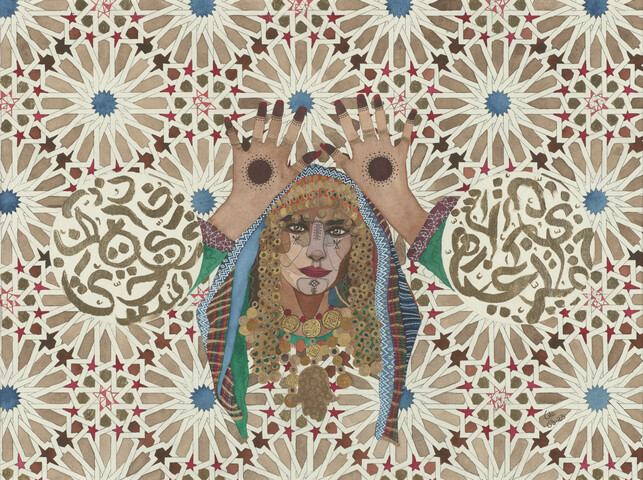Trenton-Based Artists Investigate Cultural Belonging in New Princeton University Art Museum Exhibition

Artworks by Alia Bensliman and Khalilah Sabree, two Trenton, New Jersey– based artists, will go on view at the Princeton University Art Museum’s Art@Bainbridge gallery this January. The exhibition of their work explores intersections between the artists’ personal, cultural, and spiritual identities.
Reciting Women: Alia Bensliman and Khalilah Sabree (January 20–March 31, 2024), curated by Juliana Ochs Dweck, chief curator at the Princeton University Art Museum, draws on the artists’ experiences of cultural belonging and on their interest in Islamic and Indigenous North African visual cultures. For Bensliman and Sabree—both deeply rooted as artists and educators in their Trenton communities—their identity as Muslim American women informs their artistic practice. In her work, Bensliman intermingles Amazigh symbolism and Arabic calligraphy from her native Tunisia; Sabree draws on Islamic architectural and ornamental motifs and reflects on her spiritual journey as an African American Muslim. Although both artists grapple with themes of the sacred and the secular, their approach to their work is as unique as each woman’s unfolding identity.
The exhibition features six large-scale works from Sabree’s series Destruction of a Culture (2016–17), evocative mixed-media paintings inspired by a photograph the artist took during her own pilgrimage to Mecca of two African women gazing over a fence. Each work in the series— which includes Broken Promises, When Things Fall Apart, and The Inner Compartment—is the size of a window to suggest that we are peering beyond our own lives to gain insight into experiences of others. The series imagines the two women as they contemplate physical and spiritual changes in the world around them, even as they firmly grasp symbols of their own religious practices.
Bensliman’s series North African Women includes luxuriously patterned portraits of Indigenous Amazigh women. Having grown up surrounded by arabesque geometric art, the artist likens the repetitive patterns of the Islamic tradition to “therapeutic kaleidoscopes.” Bensliman merges figurative art with geometric ornament to represent her subjects, whether a traditionally tattooed woman in Pride and Envy (2022) or her own triple self-portrait Me, Myself, and I: Unfinished Conversation (2023). Visitors to the exhibition can also view Bensliman’s wedding dress, a richly embellished garment from the island of Djerba—historically home to a mix of Amazigh, Muslim, and Jewish cultures—while listening to music by Ghalia Benali, a French-Tunisian singer with Amazigh roots, who is also a cousin of the artist.
“Alia Bensliman and Khalilah Sabree iterate and innovate with materials and visual languages, with inspirations that range widely, from North African textiles to photography,” said Dweck. ”Their work productively opens conversations about identity, religion, and the complexities of belonging in ways that are deeply personal but also generously invite a range of responses.”
“Through their work, Alia Bensliman and Khalilah Sabree open a window into remarkable worlds in which traditions not only are preserved but also are reinvented,” said James Steward, Nancy A. Nasher–David J. Haemisegger, Class of 1976, Director of the Princeton University Art Museum. “While each artist inhabits a unique practice, both call for unity and empathy and provide compelling insights into the vital world of studio practice in today‘s Trenton.”
The artists will participate in a series of public programs, including a conversation with Princeton University’s assistant dean for Muslim life and artist-led workshops at Artworks Trenton.
Trenton Daily was lucky enough to speak to the artists, who had the following to say about their work and their connection with Trenton:
How have your lived experiences and identity played a role in shaping who you are as an artist?
Alia Bensliman: My maiden name, Ktari, means “from El Ktar,” an indigenous Amazigh town in the mountainous southwest of Tunisia. I first encountered Amazigh pottery on a class field trip as a child. I fell in love with its intricate patterning and rich colors. My paintings in Reciting Women draw on both Amazigh and Islamic patterns. Making this work during the pandemic – when I was isolated from my community and far from where I grew up – helped keep me connected to my culture and my roots.
Khalilah Sabree: My family moved to Trenton when I was five. Although I was raised with limited means, I always had access to art supplies in school. I had amazing teachers in Trenton public schools, at The College of New Jersey and at The University of the Arts, who all encouraged and facilitated my development as an artist. My mixed media practice came from working with what was available to me. I remember creating a painting using shoe polish and spackle. I’m sure that’s where the heavy textural quality in my work began.
My work is also a place for spiritual expression and the place through which I have found my voice. I converted to Islam at the age of 20, and it continues to influence how I see the world. Being African American, Muslim, and a woman brings preconceived notions of how my work should look. I continue to challenge those expectations by remaining true to myself and not allowing myself to be boxed in.
What does it mean to you to have the opportunity to represent Trenton in this way?
Khalilah: It’s an honor to represent Trenton with this exhibition. However with opportunity comes responsibility. I want to represent Trenton in a way that uplifts its rich history. The media often paints a negative picture of Trenton, but for me it’s the ground from which I’ve come. It’s a diverse city, and the arts is one of its life forces. The arts community here is incredibly supportive of artists and of Trenton’s youth.
Alia: When I moved to the United States from Tunisia, Trenton adopted me as one of its own. That was very meaningful to me, because as a recent immigrant at that time, I felt shy about showing my work in galleries. Starting to volunteer at Artworks in 2015 brought me even closer to Trenton’s arts community. The young artists I work with inspire me every day.
I hope this show also encourages people to come out to Trenton and to support the arts scene here. Come out for a First Friday, when four amazing galleries open their doors to visitors. It breaks my heart to hear people disparage this community. I want people to come visit and see what we’re really about.
What do you hope visitors take away from their experience at the exhibition?
Alia: I hope they’ll spend time first with Khalilah’s work, taking in her meditative, intricate exploration of faith. Then I hope they’ll join me on my journey to discover the beauty, customs, and traditions of the Amazigh people, with surprises in each room.
Khalilah: I hope visitors will come to see two women representing the world from different but similar perspectives. I think it was an excellent choice to put us together in this exhibition because we are presenting a contrast: Alia paints her rich tradition, while my work depicts the destruction of communities through war and its effect on the human spirit and the physical environment. I hope viewers come in with clear glasses and an open mind and leave with a feeling of renewal and hope.
What is the best way for people to find you/support your work?
Khalilah: My website is Khalilahsabree.com, and I’m @ksabreeart on Instagram.
Alia: My website is aliabenslimanart.com, and my Instagram is @alia_bensliman_art.
ARTIST CONVERSATION
Khalilah Sabree and Imam Khalil Abdullah
Thursday, February 15, 5:30 p.m.
The artist Khalilah Sabree joins Imam Khalil Abdullah, the assistant dean for Muslim life at Princeton University, for a conversation exploring her work in relation to her faith, her identity as an African American Muslim, and the role of art in Islam. Cosponsored by the Museum, the Muslim Life Program, and the Office of Religious Life. Reception to follow.
ARTIST-LED WORKSHOP
Alia Bensliman: Handmade Watercolors
Saturday, March 23, 2–4 p.m.
The artist Alia Bensliman leads this public workshop at Artworks Trenton. Beginning and intermediate artists will create their own handmade watercolor palette. Suitable for students ages 15+. All materials provided; registration is required.
ARTIST-LED WORKSHOP
Khalilah Sabree: Concerning the Spiritual in Art
Saturday, March 23, 4:30–6:30 p.m.
The artist Khalilah Sabree leads this public workshop at Artworks Trenton. Participants will explore how their spiritualities shape their practices, allowing them to create more meaningful and authentic art while confidently navigating the art world. Space is limited; registration is required.
GALLERY TALK
Alia Bensliman
Thursday, March 28, 6:30 p.m.
With homemade watercolors, micron pens, and a passion for color and pattern, Alia Bensliman celebrates Amazigh women, Indigenous to North Africa. Embedding vivid portraits within tessellations inspired by Islamic arabesque motifs, she observes traditional Amazigh textiles, jewelry, and tattoo symbols while creating space to reflect on her own life and experience.
Reciting Women: Alia Bensliman & Khalilah Sabree is organized and presented by the Princeton University Art Museum.
###
About Art@Bainbridge
Art@Bainbridge is made possible through the generous support of the Virginia and Bagley Wright, Class of 1946, Program Fund for Modern and Contemporary Art; the Kathleen C. Sherrerd Program Fund for American Art; Joshua R. Slocum, Class of 1998, and Sara Slocum; Rachelle Belfer Malkin, Class of 1986, and Anthony E. Malkin; Barbara and Gerald Essig; Gene Locks, Class of 1959, and Sueyun Locks; and Ivy Beth Lewis. Additional support for this exhibition is provided by the Africa World Initiative; the Program in African Studies; the Graduate School—Access, Diversity and Inclusion; the Department of African American Studies; the Princeton African Humanities Colloquium; the Department of Music; and the Program in Linguistics.
About the Princeton University Art Museum
With a collecting history that extends back to 1755, the Princeton University Art Museum is one of the leading university art museums in the country, featuring collections that have grown to include more than 115,000 works of art ranging from ancient to contemporary art and spanning the globe. Committed to advancing Princeton’s teaching and research missions, the Art Museum also serves as a gateway to the University for visitors from around the world.
The main Museum building is currently closed for the construction of a bold and welcoming new building, slated to open in spring 2025.
Art on Hulfish, a gallery project of the Art Museum located at 11 Hulfish Street, is open daily. Art@Bainbridge, a gallery project at 158 Nassau Street, is open Tuesday through Sunday. Admission to both galleries is free.
The post Trenton-Based Artists Investigate Cultural Belonging in New Princeton University Art Museum Exhibition first appeared on TrentonDaily.
Powered by WPeMatico



